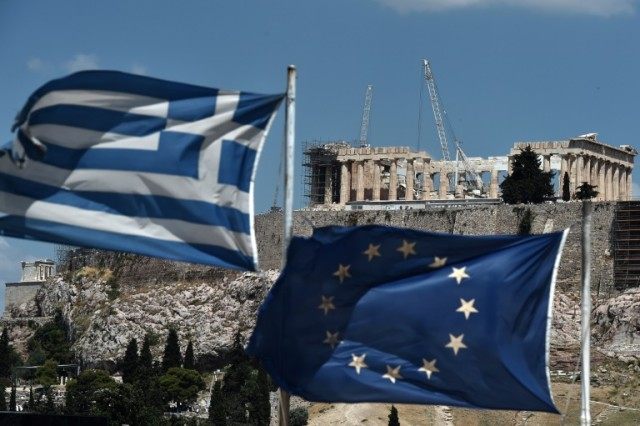Amsterdam (AFP) – Eurozone finance ministers launched thorny discussions on debt relief for Greece on Friday on the insistence of the IMF and despite deep German resistance.
Eurogroup head Jeroen Dijsselbloem said there would be no deal to unlock bailout cash to Greece at the meeting in Amsterdam, with Athens still needing to deliver on crucial reforms.
Greek Prime Minister Alexis Tsipras in July secured Greece’s third bailout in five years, worth 86 billion euros ($95 billion), on the condition of delivering on reforms.
But in one of the few concessions handed to Greece, eurozone leaders agreed to also debate ways of easing Greece’s debt burden once key reform pledges were met.
“There is more to be done and there is debt sustainability to be agreed upon as well, it’s critically important,” said IMF chief Christine Lagarde arriving for talks with finance ministers from the eurozone’s 19 member countries.
– ‘substantially better’ –
Reducing Greece’s mountain of public debt is a key condition by the IMF to remain a partner in the rescue of Greece.
The EU on Thursday said that it stood at 177 percent of gross domestic product (GDP) in 2015 — almost twice Greece’s entire economic output in one year.
The debt question is extremely sensitive in Germany, the eurozone’s most powerful member, which insists that Greece’s debt load is manageable, putting it on a collision course with Lagarde’s IMF.
“This topic is not the priority and above all, it should not distract us from what still needs to be done,” said German Finance Minister Wolfgang Schaeuble.
But complicating matters, hardline Germany also considers the IMF a crucial partner in the bailout programme, as it tows a very strict line on reforms.
“I’m just a happy man that we can start this debate and that is a good move forward,” said Eurogroup chief Dijsselbloem, who is also Dutch finance minister.
The ministers met in parallel to crunch talks in Athens between Greece and the EU, the European Central Bank and the IMF to close the first bailout review, a step which has been delayed by disagreements over pension cuts and bad loans.
Dijsselbloem said the Greek negotiators had come a long way in delivering on reforms, despite the delays.
“Let’s not be too harsh on the Greeks… These are major reforms (that will have) major impact on Greek society,” he said.
On the eve of the talks, fresh data released by the EU’s Eurostat statistics agency showed that the economy in Greece had performed “substantially better” than forecast.
If confirmed, the data could help bridge differences between the EU and IMF over further reforms required by Athens, especially on pensions.
“I welcome those new numbers that came out and I am very pleased for those numbers, if they are accurate,” said the IMF’s Lagarde.
Resolving those issues and the debt question would help close the first review and release funds to Greece.
The Greek government in July faces big repayments to the European Central Bank, amounting to about 2.3 billion euros ($2.6 billion).

COMMENTS
Please let us know if you're having issues with commenting.